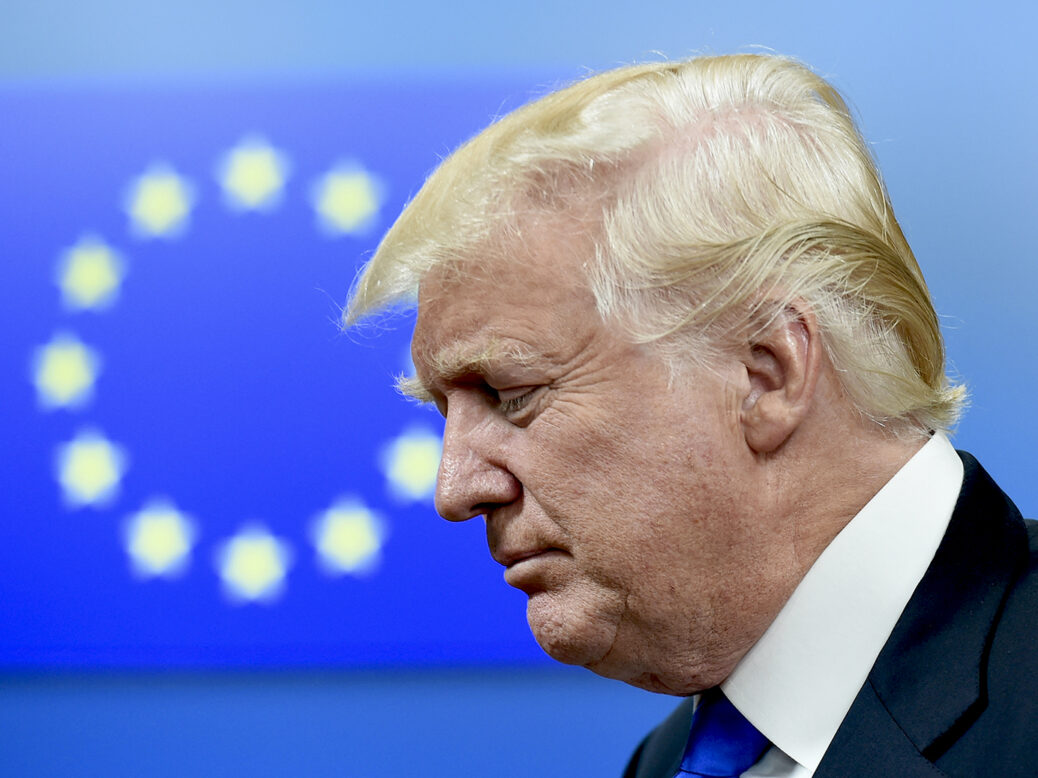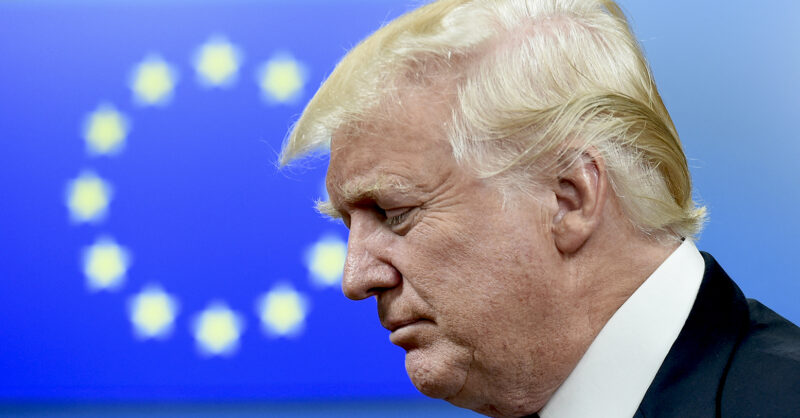
Photo by Thierry Charlier/AFP
In 2018, when Donald Trump threatened to impose tariffs on European cars, then-president of the European Commission, Jean-Claude Juncker, responded: “We can also do stupid.” When Trump then imposed steel and aluminium tariffs, the EU responded by targeting Harley-Davidson motorbikes and bourbon. It wasn’t long before the two economic blocs agreed to put further tariffs on hold. It was a different time.
Juncker, of course, was cut from a different cloth from today’s Commission president Ursula von der Leyen and many of the current European leaders. He had not danced the night away in Berlin in November 1989, as the Wall fell, and was not too inclined to believe in teenage ideas such as the end of history or America as a force for good in the world. He knew, as former French president François Mitterrand once put it, that between America and Europe there is a bloody economic war going on at all times, and there has been one for more than a century.
But let us be fair to von der Leyen. There is another difference between today and 2018: the war in Ukraine. For all the pablum about how the war has awakened Europe from its geopolitical slumber, the truth is very different. The war has made Europe entirely dependent on the US — even as it continues to pay for most of the war expenses — because of the belief that without American weaponry Ukraine would sooner or later be defeated.
It is a wonderful position for Donald Trump to be in. He can effectively threaten Ukraine with a tragic defeat and the EU with the consequences of such an outcome by simply allowing the withdrawal of all support for Kyiv to hover above the economic negotiations. “What a nice country Ukraine is,” he says ominously to Europeans, “it would be terrible if something happened to it.” There are no economic discussions taking place at the moment; rather, it’s the logic of military force supplanting every economic discussion.
The gangsterism has been effective. Terribly effective in fact as evidenced by the bizarre deal announced by von der Leyen over the weekend: for the privilege of paying tariffs of 15 per cent to export to the American market, the EU will reduce its own tariffs and prepare significant transfers of funds to the US energy and defense industries, themselves an informal part of the American state. I have to confess I have never seen a trade deal quite like this one where European concessions were seemingly exchanged for… more European concessions.
It’s a catastrophic outcome for a series of reasons. First, more than any other crisis in my lifetime, the deal undermines the very raison d’etre for the European Union. If the EU is after all too weak, too divided, too timid to defend European interests on the global stage, what exactly is it for? The individual states can surely be weak on their own.
Second, while European leaders have often expressed their distaste for the kind of politics Donald Trump represents, they are also the best possible argument for Trump: after all, if he can extract significant tribute from wealthy European societies, in a way his predecessors could not, why should Americans vote for anyone else? And in fact, after the deal was announced, social media was flooded by Maga accounts celebrating a victory, even turning it into a battle of the sexes, with von der Leyen coming out defeated and humiliated. Good job, everyone in the Berlaymont, you made us proud.
Third, the deal is a disaster for the European economy. We saw the impact the day after the announcement: investment banks are revising their growth forecasts for Europe and the euro fell steeply against the dollar. This is particularly hard to take because it reverses very positive dynamics after Trump returned to the White House and global investors started to look at Europe as a more predictable place to park their money. Why should they do that now that exports to the US market may fall by about 30 per cent as a result of the tariffs and investment in European technology looks doomed with the necessary funds going to buy American weapons and natural gas instead of European weapons and wind turbines.
Note how the deal determines that Europe continues to subsidise the military industrial complex in North Virginia instead of investing in its own military technology. Such investment would help Ukraine survive, but it would also reduce Europe’s vulnerability and create a level playing field for transatlantic relations. That’s the last thing Trump wants. This deal is disastrous on its own terms and doubly disastrous for creating the conditions for many similar deals in the future.
The irony is that Europeans spend an enormous amount of time discussing among themselves why their economies are falling behind the boisterous US economy. One American company, Nvidia, may soon be worth more than the 50 largest European companies. What explains this? Might it be an excess of regulation, as Mario Draghi likes to say? A taste for la dolce vita? Too much wine? Too much espresso? Perhaps Europeans lack the entrepreneurial drive of Americans, the typical justification of every colonised mind and yet not uncommon in parts of Europe. What a mystery.
Unless, of course, it has something to do with Europe’s extreme vulnerability and America’s willingness to use its unmatched military power to shape economic outcomes. Yes, it might be that.
[Further reading: The plot against Zohran Mamdani]

